#President Yoweri Museveni
Text
youtube
Pepe Onziema, human rights advocate.
May 31, 2023, Democracy Now!
So, as much as I welcome President Biden’s condemnation, I think there needs to be a lot of work done back home within the United States to make sure that these, you know, exporters of hate into a country like Uganda — because Uganda seems to be geographically positioned for, you know, for these people to come into our country and to test everything negative that they want to test in our country. So, that needs to be stopped from the backyard in the United States before it comes this side.
#uganda#eff#queer#lgbqti#protest#lgbt#lgbtq#lgbtq+ rights#human rights#trans#gay#lesbian#bi#anti gay bill#pride month#black lives matter#queer lives matter#trans lives matter#2023#us politics#africa#christian nationalism#christianity#fascism#colonialism#racism#homophobia#transphobia#scott lively#president yoweri museveni
3 notes
·
View notes
Text
No. The answer is always no. If this was in any way an accepted line of thinking, then by the logic suggested by the supporters of this movement, during their five decades under communist tyranny the East Germans should've "rehabilitated" Hitler. Yeah, he was a genocidal monster, but that was in the past and there's a new dictator in the present. That's literally all this is.
1 note
·
View note
Text
Police place UGX.10M bounty on Buganda clan leader killer
Police place UGX 10M bounty on Buganda clan leader killer #Eng.DanielBbosa #LujjaBbosaTabula #Mr.AbdulKatabazi
Lujja Bbosa Tabula, a prime suspect in the killing of Eng. Daniel Bbosa (PHOTO/Police).
KAMPALA – Police on Monday announced a total of Shs100 million reward for anyone with information leading to the arrest and prosecution of Lujja Bbosa Tabula, a prime suspect in the killing of Eng. Daniel Bbosa – a former “NDIGA” Clan Leader.
Tabula 38, a resident of Kabango village, Kakoola parish, Mutubagumu…

View On WordPress
0 notes
Text
Newlywed couple killed by terror group on honeymoon in Uganda
By Associated Press, 8:10am Oct, 2023

Two tourists who were killed, along with their tour guide, in an attack near a Ugandan national park were a newlywed couple, the country's president said in a statement.
The honeymooners — a South African woman and a British man — died when unknown assailants set ablaze their tour vehicle along a road by Queen Elizabeth National Park. Their local guide was also killed.
President President Yoweri Museveni described the attack as a “cowardly act on the part of the terrorists attacking innocent civilians and tragic for the couple who were newlyweds and visiting Uganda on their honeymoon.”

Queen Elizabeth National Park is known for its abundant wildlife. (iStock)
He said the terrorists “will pay with their own wretched lives.”
Attacks within and around national parks are rare in Uganda, with specialist police units deployed there. Queen Elizabeth National Park, one of the country's most popular conservation areas, is located in a remote area of southwestern Uganda near the Congo border.
Ugandan police blamed the attack on the Allied Democratic Forces, or ADF, a shadowy rebel outfit with ties to the Islamic State group. Museveni asserted the ADF's responsibility, urging security agencies to ensure the group “is wiped out.”
Ugandan troops are currently hunting down the ADF deep inside Congo. Ugandan authorities say hundreds of ADF rebels have been killed in airstrikes in recent months.
According to Museveni, ”a small group of terrorists running away from our operations in Congo" attacked the tourist vehicle.
"The terrorists will be defeated like Kony was defeated," Museveni said, referencing a warlord who became international famous after a viral campaign.
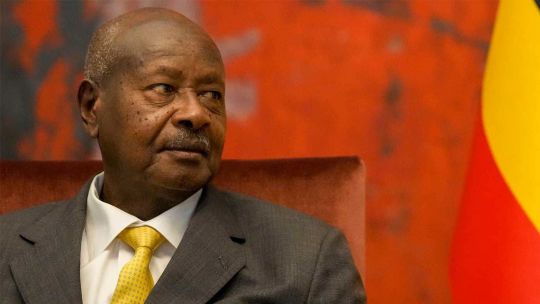
Yoweri Museveni has vowed to bring justice to the people who killed a honeymooning couple and a safari guide in Uganda. (AP)
The ADF originated in Uganda but later was forced to flee to eastern Congo, where it is accused of carrying out multiple attacks targeting civilians. The group is not known to claim responsibility for attacks it carries out.
The ADF occasionally conducts cross-border attacks. In one such attack in June, the group was accused of massacring at least 41 people, most of them students, in a raid on a remote Ugandan community near the border.
The ADF has long opposed the rule of Ugandan President Yoweri Museveni, a U.S. security ally who has held power in the East African country since 1986.
#terrorwave#terror wave#terror#wave#news#uganda#africa#south africa#great britain#terrorism#newlywed couple#President Yoweri Museveni#Queen Elizabeth National Park
0 notes
Text
Know More About the Acholi of Uganda
0 notes
Text
Donald Trump Says Hell Run For President Again in 2024

Donald Trump ka kahana hai ki waha 2024 me fir se president pad ke liye Dodenge ! Read More...
0 notes
Text
Bobi Wine: The People's President Against All Odds and Regimes
Imagine your own government trying to muzzle and stifle your voice for fear of change @natgeo #bobiwine #documentaries
History has proven if we don’t correct atrocities the first time, they are doomed to repeat. Just here in America, we have seen our country go from a place of supposed liberty and justice for all to land I hardly recognize. Women and basic human rights are being challenged and some are attempting to rewrite history. Imagine living in a country where you literally can be intimidated, beaten and…
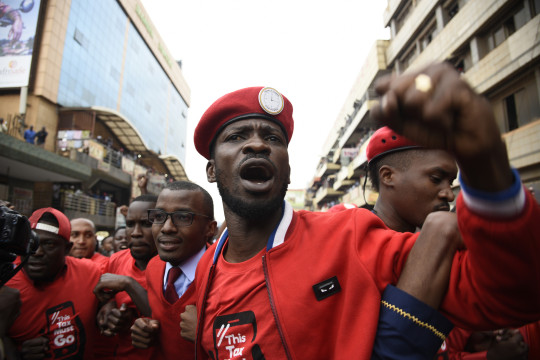
View On WordPress
#bobi wine#bobi wine the peoples president#documentaries#documentary film#national geographic documentary films#uganda#Yoweri Museveni
3 notes
·
View notes
Text
European Union are agent of “economic sabotage” , Uganda and Tanzania 🇺🇬 🇹🇿 rebukes EU
European Union are agent of “economic sabotage” , Uganda and Tanzania 🇺🇬 🇹🇿 rebukes EU

View On WordPress
#European Union#Oil Pipeline#President Samia Suluhu Hassan#President Yoweri Kaguta Museveni#Tanzania 🇹🇿#Uganda 🇺🇬
0 notes
Text
[The East African is Kenyan Private Media]
The United States has officially struck off Uganda and three other African countries as beneficiaries of the African Growth and Opportunity Act (Agoa), effectively ending Kampala’s ability to export certain commodities to the US duty-free.
In a decree dated December 29, President Joe Biden said he had “determined” that the four countries “do not meet the requirements” necessary to allow them to continue benefiting from the trade deal, effecting his earlier stated plans to delist them.
“Accordingly, I have decided to terminate the designations of the Central African Republic, Gabon, Niger, and Uganda as beneficiary sub-Saharan African countries for purposes of section 506A of the Trade Act, effective January 1, 2024,” read the statement by the US President.
In an October 2023 letter to the speaker of the US Congress expressing his intention to remove the four countries from the list of Agoa beneficiaries, Mr Biden said Uganda has “engaged in gross violations of internationally recognised human rights.”
This came after President Yoweri Museveni assented to the anti-gay law passed by the Ugandan lawmakers, which introduced serious repercussions, including life imprisonment or death, for same-sex relations in the country.
Uganda’s expulsion from the deal could destroy thousands of jobs, cause a foreign-exchange earnings drought, and low utilisation of raw materials locally, experts have warned.[...]
Over 80 percent of Uganda’s exports under Agoa were from the agricultural sector, which employs about 72 percent of the country’s workforce, indicating that the expulsion could have a significant hit on jobs.[...]
In the region, Uganda now joins South Sudan, Somalia, and Burundi on the list of countries unable to benefit from the preferential trade agreement with the US. Juba was suspended in 2015 due to the rise of ethnic conflicts.
Other countries in sub-Saharan Africa that have been removed from the list are Ethiopia, Guinea, Mali, Gabon, Cameroon, Burkina Faso, The Gambia, Central African Republic, [Niger,] Zimbabwe and Sudan.
2 Jan 24
44 notes
·
View notes
Text
South Africans protest Uganda law criminalising LGBTQ identity | Reuters
South Africans took to the streets of Pretoria and Cape Town on Friday to protest against a Ugandan law passed last week that makes it a criminal offence to be openly LGBTQ.
Singing and waving flags, demonstrators called on Uganda's president, Yoweri Museveni, not to sign it.
127 notes
·
View notes
Text
Uganda is Africa's most homophobic country. And the hatred unleashed there by the government and extremist religious groups has led to violence.
A prominent Ugandan LGBTQ+ activist is in a critical condition after he was stabbed on his way to work on Wednesday by unknown assailants on a motorbike.
Steven Kabuye, 25, suffered knife wounds and was left for dead in the assault on the outskirts of the capital Kampala before being found by local residents, police said.
Human rights defenders have been warning about the risk of attacks on members of the LGBTQ+ community after Uganda last year adopted what is considered one of the harshest anti-gay laws in the world.
Kabuye told detectives investigating the incident that he had been receiving death threats, according to a statement issued by police spokesperson Patrick Onyango.
“According to Mr Kabuye, two unidentified individuals on a motorcycle, wearing helmets, approached him. The passenger jumped off and attacked him, specifically targeting his neck with a knife,” Onyango said.
“Kabuye managed to shield his neck with his right arm, resulting in a stab wound to his hand. Despite attempting to flee, the assailants chased and stabbed him in the stomach and left him for dead,” he said, adding that local residents had found him and taken him to a medical clinic.
You can in certain instances get the death penalty for being gay in Uganda. The assailants probably felt it was their duty to try to murder Steven Kabuye.
In May last year, Uganda adopted anti-gay legislation containing provisions making “aggravated homosexuality” a potentially capital offence and setting out penalties for consensual same-sex relations of up to life in prison.
Homosexuality has long been illegal in Uganda under a colonial-era law criminalising sexual activity “against the order of nature”, with life imprisonment possible for a conviction. The new law added further offences and punishments.
Kabuye had posted on X that he was deeply concerned about the consequences of Uganda’s Anti-Homosexuality Act 2023. “This law violates basic human rights and sets a dangerous precedent for discrimination and persecution against the LGBTQ+ community. Let us stand together in solidarity and fight against bigotry and hate,” he wrote.
Uganda is a good place to avoid even if locals just think you are LGBTQ+.
Uganda's homophobic President Yoweri Museveni seized power in January of 1986. That's so long ago that the Space Shuttle Challenger was still intact when he began his reign as de facto president for life. According to the journal Foreign Policy, Museveni may be looking to turn Uganda into a North Korea-style monarchy without crowns.
Politics in Uganda has become a parable of dynastic decay. For 37 years, President Yoweri Museveni has ruled with a supporting cast of relatives, army officers, and hangers-on. They see themselves as the only ones capable of running the country—and have profited handsomely from doing so. Museveni has twice had the constitution rewritten to remove limits on his rule. But he is now 78, and he cannot rewrite biology.
Enter his 49-year-old son, Muhoozi Kainerugaba: a hard-drinking, trash-tweeting soldier who considers himself “the most handsome General on earth.” After a rapid promotion through the army ranks, Kainerugaba says he wants to run for president at the next election in 2026.
Uganda is part of the corrupt Axis of Homophobia which includes Russia and Iran. It deserves the same opprobrium which is directed at those decrepit régimes.
#lgbtq+#homophobia#steven kabuye#uganda#violence against gays#the axis of homophobia#yoweri museveni#muhoozi kainerugaba
35 notes
·
View notes
Text
Never forget this stuff in particular gets funding from churches. Chill Fil A literally donates to a church that pays a pastor go to over to Uganda and get this stuff out together.
Everyone talks about “the right wants sharia law” but what they really want is to find a way to import Ugandas Anti-Queer laws to the states.
78 notes
·
View notes
Text
MUSEVENI: HOW NATO SCUPPERED AFRICAN MISSION TO SAVE LIBYA
Thirteen years ago today, NATO doomed Africa’s richest nation to failure - as it launched its intervention to topple Pan-African leader Muammar Gaddafi from power. This didn’t just spell disaster for Libya, which was eventually overrun by extremists who brought back open slave markets, but for the wider region as well, as the security crisis spilled over into the Sahel, leaving a trail of tens of thousands of African bodies. To this day, the likes of Burkina Faso and Mali are having to fight jihadist insurgents as a result of NATO’s 2011 regime change.
The worst of it is that it could all have been prevented - if, as Uganda’s president explains in this clip, Africans had been left to their own devices.
Yoweri Museveni relates how six African presidents had decided to fly over to Libya to mediate peace. But NATO stopped their plane mid-flight and ordered them to turn back - even though it was going from Africa to Africa via African airspace!
The impromptu peace mission was conceived at the residence of the president of Mauritania, who was hosting other African heads of state at the time, including the chair of the African Union.
Museveni tells his audience it’s a sign of just how much contempt the West has for us. The fact that the plane did as it was told, he says, shows how weak some African leaders still are. It’s the kind of weakness that saw us colonised in the first place, he claims.
He peppers his tale with a few jokes to take the sting out.
Libya is still suffering today from NATO‘s actions. When will bodies like the African Union learn stand up to outside meddling? Even now, member state Kenya looks adamant on doing America’s bidding in Haiti. Or think of how West African bloc ECOWAS did the West’s bidding over Niger.
Have a watch of Museveni telling his tale,
13 notes
·
View notes
Text
About 100 members of the LGBTQ community marched to Parliament to plead with President Cyril Ramaphosa to intervene and discourage Ugandan President Yoweri Museveni from signing into law a new bill that criminalises homosexuality.
The protesters held up placards that read: “Abolish the Anti-homo Bill”, “Love is Love”, and “Protect Queer Kids”, as they marched and sang struggle songs.
The march included representatives from the Desmond Tutu Health Foundation, Safe Place International, Triangle Project, Pachedu, Gender Dynamics and #UniteBehind.
Jacqui Benson-Mabombo, a spokesperson for Shemah Koleinu (Hear our voices), said the bill is only waiting for the Ugandan president’s signature.
“We are calling on our president to come out and object to what is happening in Uganda.”
67 notes
·
View notes
Text

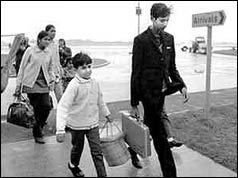
On 18th September 1972, BBC News reported that the first 193 Ugandan refugees, fleeing persecution by the country’s military dictatorship, had arrived at Stansted Airport, Essex. Over half of the arrivals had British passports, and housing and immediate needs would be overseen by the Ugandan Resettlement Board.
Uganda’s Asian community, numbering around 55 000, many of whom ran family businesses and small enterprise, were ordered in August 1972 to leave the country within 90 days by President Idi Amin. Amin had publicly denounced Ugandan Asians as ‘bloodsuckers’, threatening that any who had not left by the arbitrary deadline of November 8th would be interned in military detention camps.
Many of the initial flight of refugees had endured frightening experiences prior to their departure from Uganda, at the hands of Amin’s troops. "On the way to the airport the coach was stopped by troops seven times, and we were all held at gun point," one refugee told reporters. Another stated that he had been robbed of personal valuables and Ugandan currency on the way to Entebbe airport.
News reports at the time cited some opposition within the UK over the acceptance of the Ugandan Asians. The Leicester local authority mounted a newspaper campaign urging refugees not to come to their region seeking jobs and housing. The BBC asserted that, in hindsight, the resettlement programme was seen as ‘a success story for British Immigration’.
The loss of the hardworking and successful Ugandan Asian community devastated Uganda’s agriculture, manufacturing and commerce. Idi Amin was deposed in 1979 and died in Jeddah in 2003, having been responsible for the deaths of as many as 300 000 Ugandan civilians during his reign of terror as President. In 1991, Ugandan President Yoweri Museveni invited the expelled community to return home to help rebuild the economy.
The Wilson Labour government also had to grapple with a refugee crisis from a former African colony.
In February 1968, BBC news reported;
"…Another 96 Indians and Pakistanis from Kenya have arrived in Britain, the latest in a growing exodus of Kenyan Asians fleeing from laws which prevent them making a living…"
Many Asian people living in Kenya had not taken up Kenyan citizenship following the country’s independence from Britain in 1963, but possessed British passports. Under Kenya’s Africanisation policy, non-citizens required work permits, and were being removed from employment in favour of Kenyan nationals. There was growing public demand for laws to prevent non-citizens from owning businesses or even operating as street and market traders. As a result, British passport holders were leaving Kenya at the rate of 1000 per month, leaving a huge deficit in skills and experience within the business community and civil service.
Fearing a backlash over the large numbers of Asian immigrants, Home Secretary, and future Prime Minister, James Callaghan, rushed through the Commonwealth Immigration Act, which made it a requirement that prospective immigrants must have a 'close connection' with Britain.
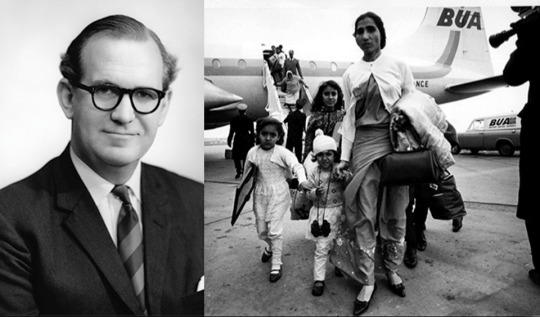
This led to disagreement in Cabinet, with Secretary of State for Commonwealth Affairs, George Thomson (1921-2008) arguing;
"…To pass such legislation would be wrong in principle, clearly discrimination on the grounds of colour, and contrary to everything we stand for…"
In 1971, the Heath government made further legislative changes that would mean that (some) immigrants from Commonwealth countries would be treated no more favourably than those from the rest of the world, and that tightened restrictions on those who stayed by linking work permits to a specific job and location, requiring registration with police, and reapplication to stay in Britain each 12 months.
The Patrial Right of Abode lifted all restrictions on those immigrants with a direct ancestral connection with Britain.
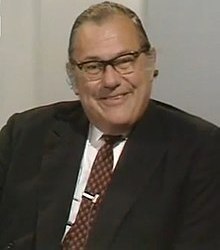
Home Secretary Reginald Maudling (later famous for being smacked in the face by Irish MP Bernadette Devlin, and for having to resign over a corruption scandal linked with disgraced property developer John Poulson) denied that this was, in effect, a 'colour bar', telling the BBC;
"…Of course they are more likely to be white because we have on the whole more whites than coloureds in this country, but there is no colour bar involved…"
Unsurprisingly, not everyone was convinced.
Vishna Sharma, Executive Secretary of the Joint Council for the Welfare of Immigrants, described the bill to BBC News as, "basically racially discriminatory, repressive and divisive," and added, "It will create divisions amongst the Commonwealth citizens already living in this country on patrial and non-patrial basis. It will create day-to-day bureaucracy and interference on people living in this country. It will create more hardship for people wanting to enter into this country."
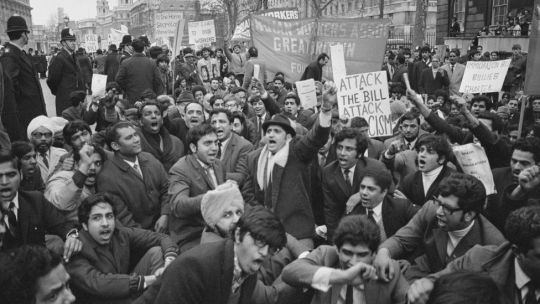
(Source; BBC reporting and history.com. Photo Credits; BBC News)
#social history#uk politics#working class history#social justice#uk government#human rights#uk history#british culture#society#history#race relations#immigration
26 notes
·
View notes
Text
In the summer of 2022, I crossed from Rwanda into the besieged Congolese city of Goma. The slick Rwandan border police and their Chinese-made black polymer carbines stood in stark contrast to the weary Congolese soldiers’ ancient Kalashnikovs. “We can’t invade Rwanda or Uganda,” a hardened Congolese provincial politician admitted to me. He slid his fingers across his neck, adding, “But we can’t negotiate with a knife to our throat.”
Since that conversation, Rwandan troops and their local March 23 Movement (M23) proxy forces have completely encircled Goma. While the Rwandan government simultaneously denies supporting M23 while justifying its intervention as necessary for Rwandan security, the direct involvement of Rwanda has been extensively documented by the United Nations and acknowledged with alarm by the U.S. State Department.
Humiliated, many Congolese are now ready to take the war to its source. The prospect of interstate war in the region looms once more. The last time these states committed to war, as many as 5.5 million people died. The United States is the leading bilateral donor to Rwanda, giving over $170 million in assistance last year to a country where more than 40 percent of the national budget is made up of international aid. The U.S. government needs to use its overwhelming leverage to keep this deadly inferno in check.
Rwandan support for M23 introduces an unacceptable risk of regional escalation. Congolese President Felix Tshisekedi is managing the aftermath of his recent controversial reelection; Burundi’s elite is well armed and divided; Uganda is approaching a leadership succession crisis as its aging president, 79-year-old Yoweri Museveni, promotes his unpredictable son (best known for his undiplomatic use of social media) to head the armed forces; and Rwanda’s veneer of development hides its own volcanic tensions.
All these countries now have troops staring one another down in eastern Democratic Republic of the Congo. It would be a mistake to underestimate the frustration felt by many Congolese and the willingness to challenge Rwanda on its own territory.
Such a major security threat should be unacceptable to the United States. The Islamic State, also active in eastern Congo, is gaining ground and staging regional terrorist attacks as Congolese and Ugandan troops reposition to confront M23. There are concerns that Congo may turn to Russia to buttress its struggling army, although thus far Kinshasa has stuck with non-Russian (primarily Romanian) military contractors. Congo’s most effective weapon in the conflict is the recent arrival of Chinese attack drones. U.N. peacekeepers and the incoming South African-led multilateral military intervention are destined for retreat, humiliation, or quagmire if the conflict drags on. No external actor has the will to commit the resources needed to defeat M23 on the battlefield.
There are also less tangible but more serious reputational costs for U.S. inaction. Tshisekedi vocally threw his weight behind the United States against outright Chinese mining dominance and in support of U.N. resolutions condemning Russia’s war in Ukraine. If the United States is serious about attracting partners in Africa, it needs to support them when they are threatened.
That doesn’t mean turning a blind eye if Tshisekedi attempts to centralize power illegally, but it does mean forcing the Rwandans to the negotiating table. More broadly, not responding to aggression in central Africa reflects poorly on the Biden administration’s public commitment to international norms and fuels accusations of hypocrisy as Washington condemns Russian aggression in Ukraine.
The goodwill toward the United States in Congo is precarious, tainted as it is by the memory of steady support to Uganda and Rwanda throughout their invasions of Congo between 1996 and 2003. But Washington has also shown that it can flex its muscle when needed—and get the results it seeks.
In 2012, the U.S. and U.K. governments dramatically cut aid to Rwanda in response to the first M23 rebellion. It was not a smooth process, and the decision to cut aid only followed a media storm over M23’s takeover of the provincial capital of Goma. (Learning from this experience, the current rebellion initially encircled rather than captured the high-profile city.) However, it was effective. Rwanda withdrew support from M23 while remaining a U.S. aid recipient. The Congolese security situation temporarily improved.
Until the resurgence of M23 in late 2021, Rwanda’s military action in the Congolese provinces of North and South Kivu was restricted to covert actions, proxy conflicts, and consensual interventions with Congolese government approval. While occasionally destructive (particularly in 2019 in South Kivu), these actions did not provoke widespread countermobilizations or displacement.
In 2022, the U.S. government response started slowly and gradually ramped up pressure while maintaining a public stance of neutrality. Congolese support for the sanctioned Democratic Forces for the Liberation of Rwanda (FDLR), a Congo-based Rwandan rebel group led by members of the genocidal regime overthrown in 1994, was raised on equal footing with Rwandan support for M23, effectively endorsing the Rwandan narrative that the M23 rebellion was a necessary security measure.
U.S. Secretary of State Antony Blinken, who met with both Tshisekedi and Rwandan President Paul Kagame in August 2022, continued to reiterate equal responsibility. While stern words were supposedly exchanged behind closed doors, no sanctions resulted. The U.N. groups of experts continued to observe multiple phases of offensives and consolidation by M23 with direct Rwandan military support.
Finally, after year and eight months of conflict, six individuals were sanctioned in August of 2023: three FDLR commanders, one M23, one Congolese general, and one Rwandan general. The Rwandan general was promoted in response. The small amount of military aid given to Rwanda was only cut in early October 2023. There were no cuts to development programming, and Rwanda’s eligibility in the flagship U.S.-Africa trade agreement, the African Growth and Opportunity Act, was renewed.
Only in February, as M23’s forces finally turned to march on Goma, did the State Department put out a decisive statement condemning Rwanda and the escalation “caused by the actions of the Rwanda-backed, U.S.- and UN-sanctioned M23 armed group.”
Although necessary, taking a firmer line with Rwanda will have costs. The Rwandan government is a famously responsive security, trade, and development partner in a region infamous for poor governance. Since the aid cut in 2012, the Rwandan government has continuously strived to build this reputation as a good partner into diplomatic leverage to avoid a repeat of that embarrassing rebuke. It may have found that leverage in Mozambique and the Central African Republic, where Rwandan military forces offered badly needed security, allegedly subsidized through French development aid.
Washington is heavily invested in successful development programs enabled by the relatively effective governance of the Rwandan state. Cutting effective development programs, endangering budding business relationships, and retracting military partnerships are not desirable for the United States. Yet these costs pale in comparison to the risks of continuing escalation.
There are also concerns that U.S. perceptions of Washington’s regional interests may be distorted by an overly sympathetic view toward Rwanda by officials at the U.S. Embassy in Kigali. This concern has been raised privately by some U.S. officials in Uganda and Congo toward their Kigali-based colleagues.
Effective domestic development programs, consistent engagement, and tight control of speech by the image-conscious Rwandan state give Kigali-based international entities a view that is devoid of opposition voices. This concern is echoed among many regional political observers who see Washington as soft on Kigali. In Congo, this observation manifests in popular conspiracy theories of a grand CIA-orchestrated Rwandan ethnic imperial project.
Regardless of the cause, indecision undermines the Biden administration’s regional foreign-policy objectives of building bridges with South Africa—a leading economy on the continent— supporting a growing partnership with Kenya, and reaching strategic mineral deals in Congo, all of which take precedence over the strained partnership with the relatively small country of Rwanda.
If Rwanda withdraws its forces from Mozambique and CAR, the United States has a menu of multilateral or bilateral options to mitigate the consequences. In Mozambique, regional multilateral forces are already deployed and could be empowered. In CAR, bilateral security arrangements with the United States are rumored to be in the negotiation stages. Unlike in those conflicts, there are few good tools to stop interstate escalation in Congo once underway. For the moment, however, the U.S. government still can influence Rwanda and Congo.
Getting Rwanda to negotiate meaningfully requires pressure. While the overstretched U.S. foreign-policy apparatus must prioritize the ongoing conflict in Ukraine, war in the Middle East, and security threats in East Asia, proactive engagement in Africa’s Great Lakes region will save energy and resources in the future.
Reconstructing Congo after 2003, even to its current fragile state, cost billions of dollars, and millions of lives were lost in the fighting. The United States cannot afford another major conflict there, even one that appears for now to lie on the periphery of U.S. interests.
5 notes
·
View notes